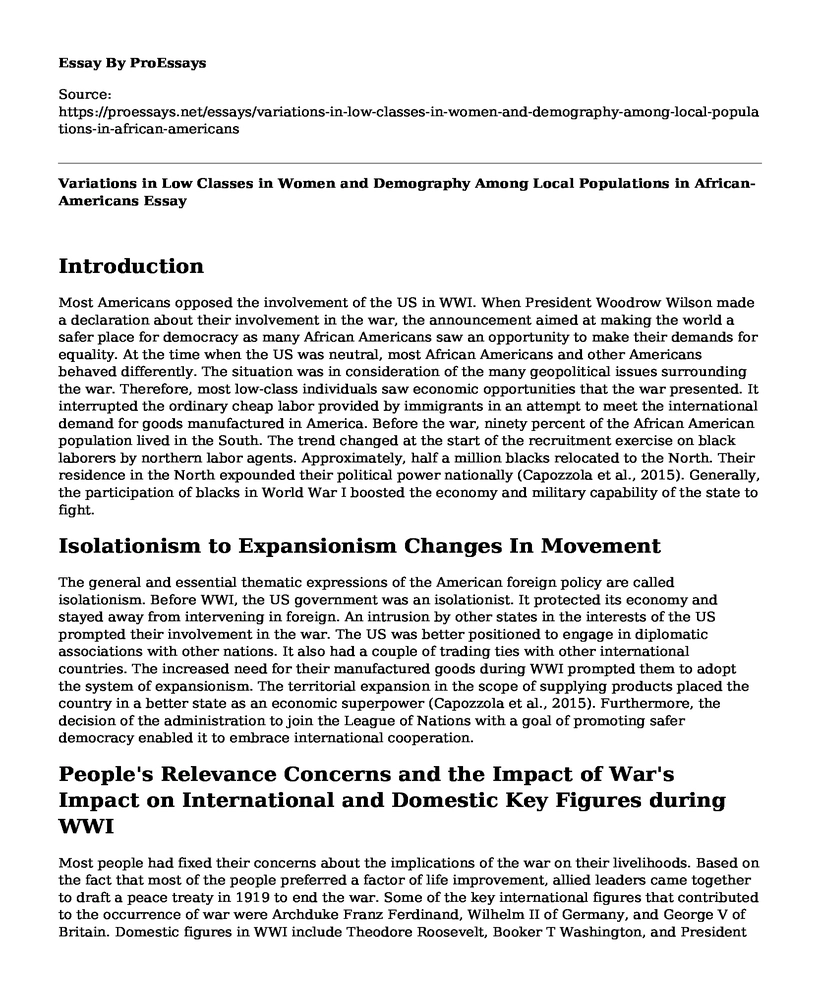Introduction
Most Americans opposed the involvement of the US in WWI. When President Woodrow Wilson made a declaration about their involvement in the war, the announcement aimed at making the world a safer place for democracy as many African Americans saw an opportunity to make their demands for equality. At the time when the US was neutral, most African Americans and other Americans behaved differently. The situation was in consideration of the many geopolitical issues surrounding the war. Therefore, most low-class individuals saw economic opportunities that the war presented. It interrupted the ordinary cheap labor provided by immigrants in an attempt to meet the international demand for goods manufactured in America. Before the war, ninety percent of the African American population lived in the South. The trend changed at the start of the recruitment exercise on black laborers by northern labor agents. Approximately, half a million blacks relocated to the North. Their residence in the North expounded their political power nationally (Capozzola et al., 2015). Generally, the participation of blacks in World War I boosted the economy and military capability of the state to fight.
Isolationism to Expansionism Changes In Movement
The general and essential thematic expressions of the American foreign policy are called isolationism. Before WWI, the US government was an isolationist. It protected its economy and stayed away from intervening in foreign. An intrusion by other states in the interests of the US prompted their involvement in the war. The US was better positioned to engage in diplomatic associations with other nations. It also had a couple of trading ties with other international countries. The increased need for their manufactured goods during WWI prompted them to adopt the system of expansionism. The territorial expansion in the scope of supplying products placed the country in a better state as an economic superpower (Capozzola et al., 2015). Furthermore, the decision of the administration to join the League of Nations with a goal of promoting safer democracy enabled it to embrace international cooperation.
People's Relevance Concerns and the Impact of War's Impact on International and Domestic Key Figures during WWI
Most people had fixed their concerns about the implications of the war on their livelihoods. Based on the fact that most of the people preferred a factor of life improvement, allied leaders came together to draft a peace treaty in 1919 to end the war. Some of the key international figures that contributed to the occurrence of war were Archduke Franz Ferdinand, Wilhelm II of Germany, and George V of Britain. Domestic figures in WWI include Theodore Roosevelt, Booker T Washington, and President Wilson (HIS 1120, n.d).
Factories Expansion and Economic Impact on Wartime Production
WWI reduced the rates of discrimination against blacks by race. Such factors came after a realization that blacks contributed to the victory of the US in the war. It also marked the inception of civil unions in an attempt to protest against discrimination thereby negating economic activities. Furthermore, WWI changed the trend of considering blacks unfit for combat and the provision of solely support duties as their primary areas of operation (Capozzola et al., 2015). It also paved the way for racial riots where people died in their quest for justice. The nation started absorbing women in other prestigious tasks that conventionally belonged to men. They include factory work, mining coal, clerks, military nurse, and teachers. Women's diligent efforts as factory workers made the state to pass the 19th Amendment that gave them a right to vote.
Pre-war and Post-War Comparison
Blacks started serving in the military as segregated units. On the other hand, the experiences of war were traumatizing. Such situation enhanced the citizens' fascination and disillusion with the ideals and values of consumerism and America's political democracy. In the political realm, a debate ensued between President Wilson and other civilians and isolationists inside the Congress who needed a review of the role of the US in international affairs. The US later joined the League of Nations, a global organization for peacekeeping in response to opposition from isolationists.
Post-War Era Positioning of the United States as Superpower
During WWI, the US has already acquired some territories around the world. Consequently, it made interventions against the war in different countries. It emanated after the war as a country with significant diplomatic moves in nations of East Asia. Therefore, it played a vital role in ending WWI. It used foreign policies to make interventions and incorporate its military might in propelling its essential interests. After WWII, the US turned out to be the only state with the most reliable economic and military capability (Capozzola et al., 2015). The situation placed it in a better position to shape all possible terms of peace. The affluence of the people of America after the war encouraged a consumer culture. Such factors propelled the US into an economically supreme state.
References
Capozzola, C., Huebner, A., & Irwin, J. (2015). Interchange: World War 1. The Journal of American History, 102(2), 463-499.
HIS 1120. (n.d). The Dawn of the 20th Century. Class notes. Pdf
Cite this page
Variations in Low Classes in Women and Demography Among Local Populations in African-Americans. (2022, Jun 13). Retrieved from https://proessays.net/essays/variations-in-low-classes-in-women-and-demography-among-local-populations-in-african-americans
If you are the original author of this essay and no longer wish to have it published on the ProEssays website, please click below to request its removal:
- Essay Sample on Interpersonal Communication
- Essay Sample on Slavery vs Freedom: A Divided America in 19th Century
- Essay Sample on Understanding Social Stratification in China & the UK
- Essay Example on Contesting OSHA Penalties and Citations: A Guide
- Essay on National Housing Act: Roosevelt's New Deal to Combat Great Depression
- French Revolution: People's Dissatisfaction With Leadership - Essay Sample
- Communication for Child Growth - Free Research Paper Sample







